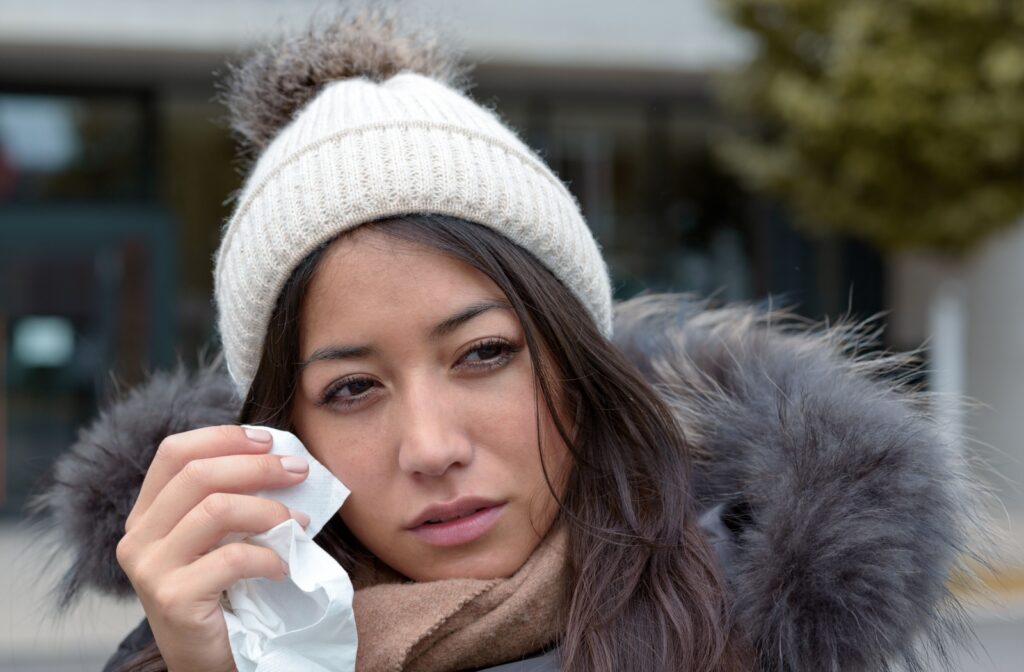As we head into the fall season and temperatures drop, the brisk air often makes our eyes watery. Cold air causes evaporation in our eyes, leaving them with a thinner cushion of tears protecting the surface. This triggers your eyes to produce more tears.
Many of us experience watery eyes during our winter adventures, whether we’re hitting the slopes, hiking through snowy forests, or simply enjoying a brisk walk. However, cold weather can often exacerbate dry eye symptoms, so taking care of your eyes is essential.
What Causes Your Eyes to Water in Cold Weather?
When you enter a cold environment, your eyes may start to water almost immediately. This isn’t just an annoying side effect of winter; it’s your body’s natural response to low temperatures. When cold air comes in contact with your eyes, your eyes work extra hard to stay moist and warm. This results in your tear-producing glands producing more tears.
Cold winds can also irritate your eyes, producing even more tears. Furthermore, the contrast between the warmth of the indoors and the colder outdoor temperatures can trigger a tear production cycle. Your eyes are simply trying to shield themselves from sudden temperature changes and harsh winds.
Another factor contributing to watery eyes in winter is the reduced humidity of the air. Cold air holds less moisture, which can lead to dryness. When your eyes detect this dryness, they compensate by producing more tears, resulting in watery eyes.
Why Are My Eyes So Sensitive to Cold Weather?
Sensitivity to cold weather varies from person to person. Some people have more sensitive eyes due to their anatomy or underlying conditions. If you have a history of dry eye disease, you’re more likely to experience watery eyes in the cold. Conditions like blepharitis or meibomian gland dysfunction can also make your eyes more sensitive.
Your daily habits and lifestyle can also influence your eyes’ sensitivity. For example, spending long hours in front of digital screens can strain your eyes, making them more prone to watering in cold weather. Additionally, contact lenses make your eyes more sensitive to temperature changes and dry air.
Lastly, exposure to environmental factors such as pollution, allergens, and wind can further exacerbate your eyes’ sensitivity to cold weather. All these combined elements can contribute to discomfort when your eyes water in chilly conditions.

How To Take Care of Your Eyes in the Winter
Preventing your eyes from watering in the cold involves protecting them from harsh conditions and maintaining their moisture levels.
Here are some practical tips to help you keep your eyes comfortable during winter:
- Wear Protective Eyewear. Wearing sunglasses or goggles can shield your eyes from cold winds and reduce tear evaporation. Look for eyewear with wraparound frames to provide maximum protection.
- Avoid Rubbing Your Eyes. Rubbing your eyes can worsen irritation and lead to more tear production. If your eyes feel itchy or uncomfortable, use a cold compress or artificial tears to soothe them instead.
- Keep Your Eyes Moist. Using a humidifier at home can help maintain indoor humidity levels, preventing your eyes from drying out.
- Use Artificial Tears. Applying artificial tear drops before heading out can help moisten your eyes and reduce excessive tear production. Opt for preservative-free drops to avoid irritation.
- Stay Hydrated. Drinking plenty of water helps maintain your body’s overall hydration, including your eyes. Ensure that you drink enough water throughout the day, especially before outdoor activities.
- Practice Good Eye Hygiene. Clean your eyelids regularly to remove debris or buildup that could irritate them. Use a gentle, hypoallergenic cleanser and warm water to keep your eyelids clean and healthy.
By incorporating these habits into your daily routine, you can keep your eyes healthy and reduce the likelihood of watery eyes in winter.
Should I See an Optometrist for Watery Eyes?
While watery eyes in cold weather are usually harmless, there are instances when you should consult an optometrist. If your eyes continue to water excessively even indoors, or if you experience additional symptoms like pain, redness, or vision changes, it’s time to seek professional help.
An optometrist can perform a thorough examination to determine the underlying cause of your watery eyes. They can also recommend treatments or medications to alleviate your symptoms. In some cases, watery eyes may be a sign of an underlying condition that requires medical attention.
Understanding Dry Eye Disease
Ironically enough, one significant underlying condition that watery eyes can indicate is dry eyes. When you have dry eye disease, your eyes either don’t produce enough tears or the tears that they do produce evaporate too quickly. This can lead to chronic dryness, irritation, and, paradoxically, excessive tear production as your eyes try to compensate for the lack of moisture.
Common symptoms of dry eye disease include:
- Persistent dryness
- Burning or stinging sensation
- Redness and irritation
- Blurred vision
- Sensitivity to light
Low humidity and cold winds can worsen dry eye symptoms in cold weather, exacerbate discomfort and lead to even more watery eyes. If you experience any of these symptoms, it’s essential to consult an optometrist for a proper diagnosis and treatment plan.
Total Vision knows that having watery eyes in cold weather can be frustrating, especially when attempting to enjoy the outdoors. Contact us today to see how we can help relieve your eyes.



